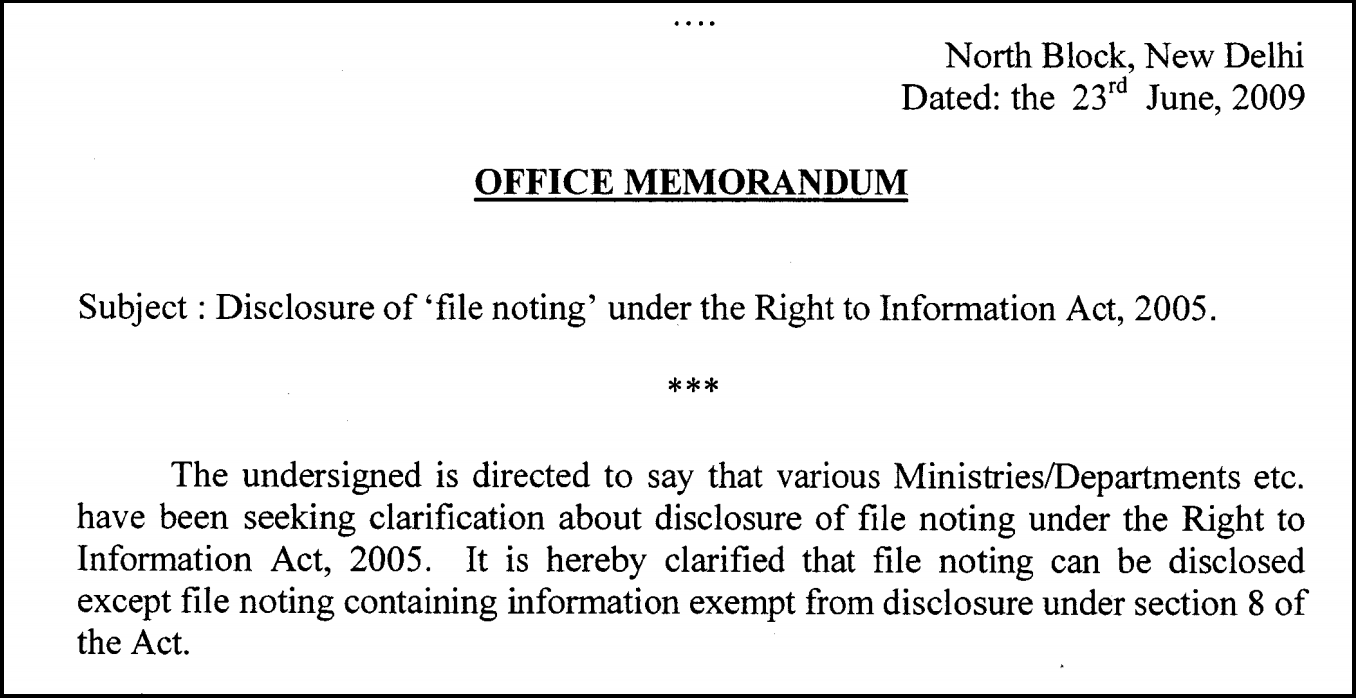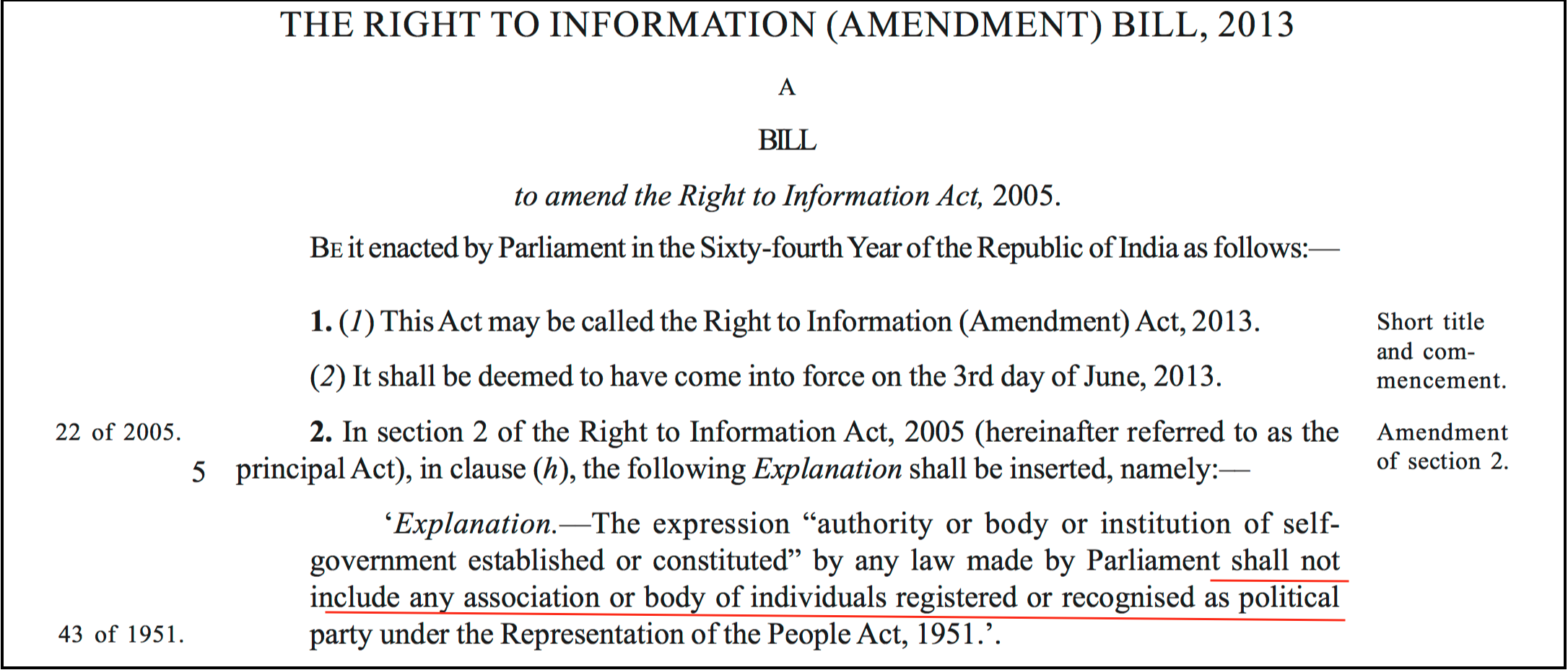[orc]The NDA government has included the RTI amendment bill in the legislative agenda of this monsoon session of parliament. This will be the Government’s 3rd recorded attempt to amend the RTI act since 2005.
The government has included amendments to the Right to Information act (RTI) in the proposed legislative business of the monsoon session of parliament beginning today. It has refused to disclose any information about the proposed amendments. This is the 3rd recorded attempt by the government to amend the RTI act since its enactment in 2005. It has to be noted that act has not been amended since 2005 despite attempts by the government.
Amendments were first proposed in 2006
Amendments to the RTI act were first proposed by the government in the year 2006. This was just one year into the enactment of the RTI. In July 2006, the cabinet approved amendments to the RTI act targeted at exempting ‘File Notings’ from RTI. ‘File Notings’ are written remarks recorded on a paper/file under consideration to facilitate its disposal. Notes are recorded by bureaucrats, ministers etc. Hence this becomes an important part of the information to understand the rationale for a particular decision/action.
 Following public pressure, these amendments were not introduced in the house. The government later clarified that file notings have to be disclosed under RTI.
Following public pressure, these amendments were not introduced in the house. The government later clarified that file notings have to be disclosed under RTI.
 Political Parties & RTI – reason for the 2nd attempt
Political Parties & RTI – reason for the 2nd attempt
In June 2013, the Central Information Commission (CIC), in its historic order, declared the six national political parties as public authorities under RTI. Following the CIC order, all the political parties were united in their opposition to this order. The amendment aimed at excluding political parties from the ambit of RTI, there by nullifying the CIC order, was introduced in Lok Sabha in August 2013. But it was not considered or debated because of public pressure.

3rd attempt now by the NDA
The current amendment is being proposed by the NDA government, apparently to transfer the power of fixing the tenure & salaries of Information Commissioners to the Central government. Though the government has not officially made the amendment public, contents available in the public domain indicate the government’s plan. Not putting the proposed amendment in the public domain is a violation of the pre legislative consultation policy.
 The contents available in the public domain indicate two broad things
The contents available in the public domain indicate two broad things
- The Central Government will now assume powers to fix the tenure of Central & State Information Commissioners instead of the five year tenure
- The Central Government will now assume powers to decide on the salaries & allowances Central & State Information Commissioners.
The Central Government’s taking over of fixing the tenure & salaries of the Information Commissioners will be a body blow to the autonomy & independence of the Information Commission. Though the Information Commissioners perform a statutory function and not a constitutional function, the parliamentary standing committee that looked into the RTI bill in 2004 supported conferring the status of Chief Election Commissioner on the Chief Information Commissioner. Incidentally, the current President of India, Ram Nath Kovind was a member of this committee in 2004.
 Former Central Information Commissioner Shailesh Gandhi has written this piece on why citizens need to be vigilant against such attempts by the government and what could be the possible impact of such amendments
Former Central Information Commissioner Shailesh Gandhi has written this piece on why citizens need to be vigilant against such attempts by the government and what could be the possible impact of such amendments
Multiple Private Member bills
As per information on the Lok Sabha website, at least 5 private member bills were introduced in the house suggesting amendments to the RTI act. The information on two of the bills is not available.
- BJP MP Kalraj Mishra proposed amendments to the act in 2007. The contents of the proposed amendment are not available.
- Former Shiv Sena MP Bhausaheb Wakchaure who contested on a Congress ticket in 2014 proposed an amendment in 2011 that sought to include reasons for seeking information as mandatory in a RTI application. The amendment also sought to include a new exemption clause to refuse access to information if the reasons for requesting information are not given or if the reasons given by the applicant are not adequate or are factually incorrect in the opinion of the public authority competent to furnish the information.

- Former RLD MP Jayant Chaudhary proposed an amendment in 2012 to include private entities that enter into PPP agreements or deliver public services in the ambit of the RTI act.

- INLD MP Dushyant Chautala proposed an amendment in 2016 to put a time limit for the disposal of second appeals by the Information Commissions.



